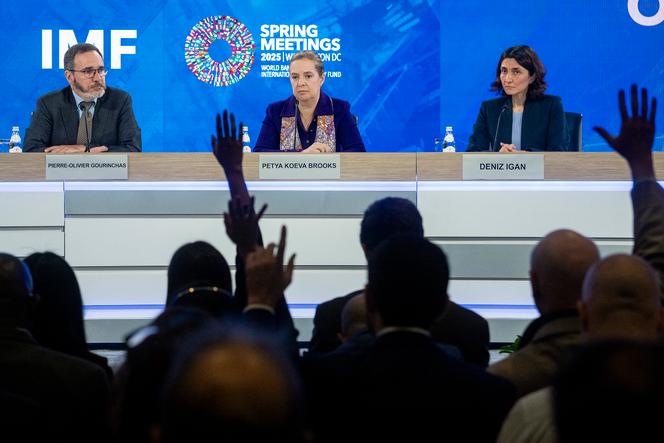IMF Navigates Trump’s Trade Policies, Global Economic Concerns
The International Monetary Fund and World Bank face a challenging habitat as trade tensions and protectionist measures impact global growth.

IMF and World bank Grapple with New Economic Realities
The International Monetary Fund (IMF) and the World Bank, cornerstones of the global economic architecture since their inception in the post-World War II era, are confronting renewed challenges stemming from the return of Donald Trump to the White House. Their annual spring meetings the week of April 21 in Washington, D.C., unfolded amidst what officials described as an “unprecedented context.”
These meetings, traditionally a forum for international cooperation, took place amid heightened scrutiny of multilateral institutions by the new U.S. administration. The IMF is tasked with maintaining international cooperation and addressing a trade war between the United States and China. The US trade deficit in goods and services was $64.2 billion in February 2025, according to the U.S. Census Bureau. In March, Trump announced additional tariffs on Chinese goods, further escalating tensions and casting a shadow over global economic forecasts.
The IMF anticipates that the Trump administration’s protectionist policies will slow global growth in 2025 to 2.8%, a reduction of 0.5 percentage points compared to projections made in January. This revised forecast reflects concerns about the impact of trade barriers and tariffs on international commerce and investment.
Director General Urges “Wisdom” in Response to Global Shifts
Kristalina Georgieva, the director general of the IMF, addressed the evolving global landscape on Thursday, April 17, stating, “We live in a world of sudden and radical reversals.” She emphasized that this situation “I need to react with wisdom.” Georgieva acknowledged that the integration of the global economy “Did not benefit everyone,” particularly citing “Communities emptied of their substance by moving jobs abroad” and employees whose remuneration “Had under the effect of the growing availability of a cheap workforce.”
Georgieva called on countries to prioritize addressing “External and interior macroeconomic imbalances.” This includes policies aimed at reducing trade deficits, managing government debt, and promoting inclusive growth that benefits a broader segment of the population. The effects of these imbalances are keenly felt in the U.S., where manufacturing job losses have fueled economic anxiety in certain regions.
| Indicator | 2023 | 2024 | 2025 (Projected) |
|---|---|---|---|
| Global Growth | 3.0% | 3.2% | 2.8% |
| U.S. Growth | 2.5% | 2.1% | 1.8% |
| China Growth | 5.2% | 4.8% | 4.5% |
Impact on U.S. Economy and Workers
The IMF’s concerns resonate with the economic realities facing many American workers and communities. The decline in manufacturing jobs, driven in part by globalization and automation, has contributed to a sense of economic insecurity and inequality. The Trump administration’s focus on trade protectionism is, in part, an attempt to address these concerns and bring jobs back to the United States.
However, economists caution that protectionist measures can also have negative consequences, such as raising prices for consumers, disrupting supply chains, and provoking retaliatory measures from other countries. A recent study by the Peterson institute for International Economics found that tariffs imposed by the Trump administration in it’s first term cost U.S.consumers billions of dollars and did not lead to a meaningful increase in domestic manufacturing output.
Counterarguments and Alternative Perspectives
While the IMF highlights the risks associated with protectionism,some argue that a more assertive trade policy is necessary to protect American industries and workers from unfair competition. Supporters of tariffs contend that they can create leverage in trade negotiations, encourage domestic investment, and reduce reliance on foreign suppliers.
For instance, proponents of the tariffs point to the steel industry, which saw a modest increase in production and employment after tariffs were imposed in 2018. However, this increase came at a cost to other sectors that rely on steel, such as the automotive and construction industries.
FAQ: understanding the IMF and Global Economic Challenges
- What is the role of the IMF?
- The IMF works to foster global monetary cooperation,secure financial stability,facilitate international trade,promote high employment and sustainable economic growth,and reduce poverty.
- How does the IMF influence U.S. economic policy?
- the IMF provides economic surveillance and policy recommendations to the U.S. government, and its assessments can influence market sentiment and investor confidence.
- What are the potential consequences of a trade war for the U.S. economy?
- A trade war can lead to higher prices for consumers, reduced exports, disruptions to supply chains, and slower economic growth in the United States.
- How can communities affected by job losses adapt to the changing economy?
- Investing in education and training programs,supporting entrepreneurship,and diversifying local economies can help communities adapt to economic challenges.
- What are “macroeconomic imbalances”?
- Macroeconomic imbalances refer to situations where key economic indicators, such as trade balances, government debt, or savings rates, are at unsustainable levels, potentially leading to economic instability.







